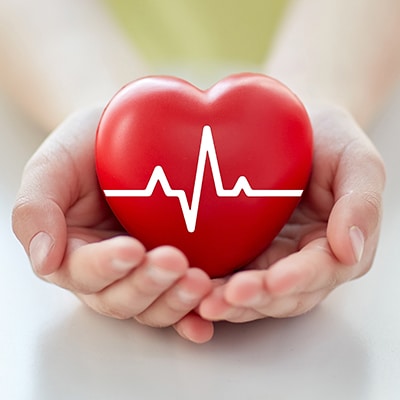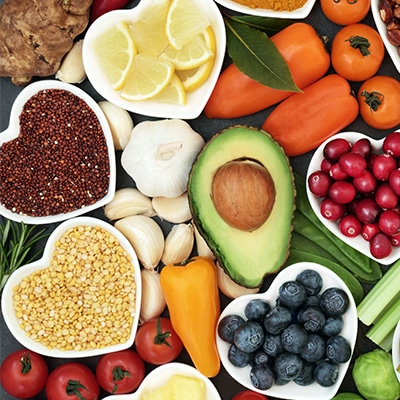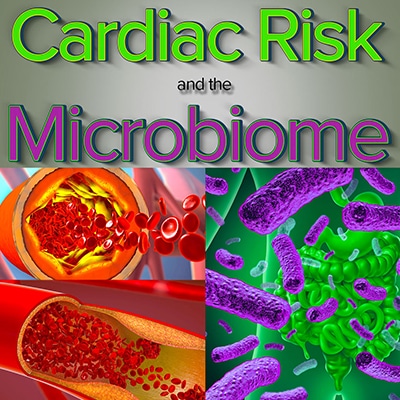Cardiac Risk and the Microbiome
Is Your Gut Bacteria Attacking Your Heart?
By now you may have realized that your gut bacteria has control over a lot of your bodily functions.
We used to think that the brain controlled everything in our bodies, but recent research is showing otherwise.
There’s the gut-brain axis that actually allows your gut to control your brain!
That being said, your gut bacteria actually has a lot of effect on how healthy your heart is functioning.
Basic Overview of the Cardiovascular System
Your Cardiovascular system is made up of your heart and everything else that circulates your blood through your body.
Your heart is actually a muscle, as well as an organ, that acts as a pump to send your blood everywhere it needs to go.
There are veins, arteries, blood vessels, and capillaries that all transport your blood like a highway system.
Your blood is like mail trucks delivering nutrients, oxygen, and other products to your organs so your body functions properly.
Some different common conditions that affect your Cardiovascular System can include:
-
- Heart Failure – The heart is unable to keep up with the blood supply needs of the rest of the body
- Atherosclerosis – Plaque build-up in arteries
- Coronary Artery Disease (CAD) – Arteries that supply the heart with blood harden and narrow with plaque build-up
- Peripheral Artery Disease (PAD) – Arteries that supply the rest of your body with blood harden and narrow with plaque build-up
- Heart attack
- Blood Clots
How Your Gut is Able to Affect Your Cardiovascular System
The gut-blood barrier (GBB) is what determines what nutrients and toxins can or can’t pass through your gut to your blood system to be circulated through your body.
Think of your GBB as the TSA of an airport.
When it is doing its job, it is difficult for harmful substances to pass through.
Similarly to how the airports are allowing more to pass through easier with the recent US government shutdown, your GBB can allow toxins to pass through into your bloodstream which can negatively affect everything in your body.
Positive Effects of Gut Bacteria on Cardiovascular System

Hydrogen Sulfide (H₂S) is the biggest name in this game. H₂S is released by certain gut bacteria in the colon or by enzymes elsewhere in the body.
You may have heard of some of the negative effects that H₂S can have on your colon like potentially causing cancer or inflammation.
These mainly happen because of excessively high levels of H₂S or H₂S is in the wrong area because of intestinal permeability (IP).
However, when H₂S is where it is supposed to be is extremely beneficial for your gut and your heart.
In your colon, H₂S helps to protect your GBB and your colonic epithelial cells are used to a H₂S-rich environment.
H₂S also helps to produce the protective mucous layer in your colon.
In your heart, it can help to reduce heart rate and blood pressure.
H₂S also helps to protect your heart and increase vasodilation and has proangiogenic (new blood vessel formation) and inotropic effects (the force and speed of heart contractions).
The Bacterial Culprit in Heart Disease
When you eat foods high in choline, your body turns it into different amines.
The main one caused in your body is Trimethylamine (TMA).
Your body does this in one of two ways. In the liver, enzymes convert the choline into TMA. In your gut, bacteria degrade the choline into TMA.
TMA itself isn’t a huge issue, however, when it goes through the N-oxidation process caused by flavin monooxygenase (FMO 1 and 3) enzymes from the liver, it is turned into Trimethylamine N-Oxide (TMAO).
TMAO is being found to be responsible for many different health issues including kidney and heart issues.
Choline can also be metabolized into betaine.
Betaine is currently being studied because high levels seem to be common alongside TMAO, however, they don’t seem to always have the same negative side effects.
Where Does Choline Come From?
Choline from your diet comes in two sources:
- Lipid-soluble – bypasses the liver
- Water-soluble – enters the enterohepatic circulation
The main dietary sources of choline include:
- Red meat
- Egg yolk
- Dairy products
- Brassica vegetables (broccoli, kale, turnips, etc.)
- L-carnitine
- Fish
**Fish and L-carnitine have been found to have positive effects on your cardiovascular system, but do result in high levels of TMAO in feces.*
Studies have been done between vegetarians and omnivores and vegetarians have much lower levels of TMAO.
When they were given L-carnitine or other sources of choline their TMAO levels actually went up significantly.
This links the choline to the higher TMAO levels and may mean that those with a vegetarian diet have lower chances of contracting cardiovascular diseases.
The Red Flag for Potential Cardiovascular Disease (TMAO)
TMAO is being looked into as a potential warning sign of different Cardiovascular Diseases (CVD).
Patients with many different forms of CVD have shown high levels of TMAO in urine, fecal and blood samples.
In one animal study, it was found that females tend to have higher levels of TMAO in urine samples than males.
This was especially true during menstrual cycles indicating that estrogen may have a major role in cardiovascular disease.
Women are 7 times more likely to die from CAD than breast cancer. More studies need to be done to check the links between TMAO and estrogen to see if women are at higher risk of CVD based on the two.
TMAO levels have been shown to cause a higher risk of atherosclerosis, CAD, PAD, blood clots, heart attack, high blood pressure, and heart failure.
It has been found that it takes between 4-8 hours for TMAO to start circulating throughout the body after ingestion of choline.
Studies have been done to see if TMAO directly leads to hypertension. Three different control groups took either TMAO, angiotensinII, or both to see the effects each had on blood pressure.
It was found that TMAO by itself doesn’t directly affect blood pressure levels, but when used in conjunction with angiotensinII (a hormone that increases blood pressure) it created higher bloo/,ld pressure levels that remained even after the subjects stopped taking the experimental doses.
“The Gut Hypothesis of Heart Failure”
There is a theory that basically says in heart failure the decrease in heart function and intestinal permeability(IP) are interrelated.
The decrease in heart function leads to intestinal inflammation and damage which leads to increased IP.
When IP is increased, it allows for toxins to float freely between the intestines and blood transport systems even when they aren’t supposed to.
Heart failure patients who have peripheral edema (swelling in their limbs) have higher plasma levels of cytokines and endotoxins.
This alone seems to help prove this theory to be true since IP would allow for cytokines (signaling cells for the immune system for inflammation and other important immune responses) and endotoxins (toxins released by bacteria cells) to circulate freely through the blood.
High levels of TMAO haven’t been linked to the causation of heart failure, but patients who have both tend to have worse symptoms and shorter lifespans.
Decreasing TMAO Levels

There are currently numerous studies trying to combat high TMAO levels. The studies with the most promising results include:
-
- Fecal Microbiota Transplant – taking microbes from feces (yours or someone else’s) and transplanting them directly into the intestinal tract
- Pros:
- Has success with other conditions
- In patients of metabolic diseases, insulin sensitivity was increased by 119-176%
- Cons:
- Sounds gross
- Has the potential to transfer harmful bacteria/toxins along with the good ones
- Pros:
- WTP Diet – Whole grains, Traditional Chinese medicinal foods, Prebiotics
- Pros:
- Easiest option
- Most natural option
- Increased insulin sensitivity, lipid profile, and diversity of bacteria that protect the gut barrier
- Decreased blood pressure, IP, and plasma endotoxin
- Cons:
- May be difficult to change diet
- Foods to eat:
- High fiber foods
- Whole grains
- Herbs/Teas
- Foods to avoid:
- Red meat
- Eggs
- Dairy
- Pros:
- Fecal Microbiota Transplant – taking microbes from feces (yours or someone else’s) and transplanting them directly into the intestinal tract
Probiotics, Prebiotics, and Antibiotics
-
-
- Pros:
- Probiotics- Lactobacillus sp reduced toxins in small intestines and changed SCFAs in carotid atherosclerosis patients
- Prebiotics- Increased glycemic control and plasma lipid profiles
- Antibiotics- Kill bad bacteria
- Cons:
- Probiotics- Studies have not proven the effects to be greater than placebo
- Prebiotics- Don’t seem to affect everyone the same way
- Antibiotics- Can kill good bacteria as well and upset the balance of the microbiome
- Pros:
-
Small Molecule Antimicrobial Enzyme Treatment
-
- Pros:
- First “drug” for the microbiome
- Targets microbes and stops the conversion of choline to TMA
- Animal testing proved that it worked with minimal side effects
- Cons:
- Minimal research since it is a new product being studied
- Pros:
Do you know anyone that can benefit from this information?
Give this article a “Share” across your social media platforms to help someone out!
